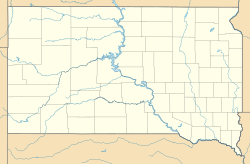Mitchell Prehistoric Indian Village facts for kids
|
Mitchell Site
|
|
 |
|
| Location | Indian Village Rd., Mitchell, South Dakota |
|---|---|
| Area | 41.1 acres (16.6 ha) |
| NRHP reference No. | 66000712 |
Quick facts for kids Significant dates |
|
| Added to NRHP | October 15, 1966 |
| Designated NHL | July 19, 1964 |
The Mitchell Site is a really important place in Mitchell, South Dakota, where archaeologists have found amazing things from the past. It became a special National Historic Landmark in 1964. Back then, it was the only site from a time period called the Lower James River Phase that scientists could accurately date.
Today, the site is protected under a big dome. It's run by a group called the Mitchell Prehistoric Indian Village, and you can visit it! You can even watch archaeologists carefully dig up old tools and other items in the Thomsen Center Archeodome. The Boehnen Memorial Museum nearby shows off a rebuilt ancient home and lots of the cool things found here.
Contents
What Was the Mitchell Site?
The Mitchell Site is located north of downtown Mitchell, near Lake Mitchell. This area was once a busy village. It had many homes, called lodges, which were surrounded by a ditch and a strong wooden fence, known as a palisade.
How Did People Live Here?
The people who lived at the Mitchell Site got their food in many ways. They were skilled farmers, growing much of what they ate. Archaeologists have found tools like hoes and special knives for squash, which shows they worked the land. They also found burnt seeds and corn cobs. This tells us they grew corn, beans, squash, sunflowers, and even tobacco.
Discovering the Past: Archaeology at the Site
Archaeology is the study of human history and prehistory through digging up old sites and analyzing artifacts. The Mitchell Site was first officially recorded by archaeologists in 1922. At that time, they noted about 45 earth lodge sites. These homes stretched northward on a piece of land overlooking Firesteel Creek.
Changes to the Site Over Time
Since 1922, the area around the site has changed a lot. Firesteel Creek was dammed to create Lake Mitchell. Also, a golf course was built south of the village. This construction damaged some of the original ditches that once protected the settlement.
Early Digs and Discoveries
In 1938, crews funded by the Works Progress Administration dug up two house areas. Later, in 1971, another house was excavated. This house showed signs of having been destroyed by fire. However, because of the fire, many details about how the house was built were perfectly preserved.
Protecting the Site Today
In 1975, a special non-profit organization was created. Their goal was to continue the important archaeological work at the site. They also wanted to make sure this amazing piece of history would be preserved for future generations.
See also
 | Jewel Prestage |
 | Ella Baker |
 | Fannie Lou Hamer |



